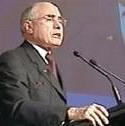|
Editorial-30 August 2005 |
|
As The Sydney Morning Herald's Deborah Smith tells it the Prime Minister, John Howard, once told Australia's resident Nobel Laureate, Peter Doherty* that if he wanted to effect political decisions he should voice his concerns publicly.
We don't know the circumstances which prompted the Prime Minister's advice but on face value it appears to speak volumes about the populist drivers of governmental policy -- at least as far as matters that might exercise Professor Doherty are concerned.
Since taking up his laureate professorship at the University of Melbourne in July 2002, Peter Doherty until recently has been anything but highly visible in the mass media. True in March 2002 he spoke before The Brisbane Institute on "Smart Nation? Education, Science & Prosperity" but as a public utterance it was pretty low profile.
But then Dorothy Illing in the March 31, 2004 Australian quotes him as saying that universities in Australia were penalised for attracting high-quality researchers, a fundamental difference from the US system. There, a $1 million grant for five years would attract a 42 per cent payment - or $420,000 -- to the host institution for infrastructure support. Then in May 2004 following the Prime Minister's, announcement of Backing Australia's Ability 2, he told the Fairfax's Alban Contractor, "Science is not just about translating research into short-term commercial reality. The way real innovation happens in science is people go out and make discoveries."
Moving right along, in late September shortly before the federal election Peter Doherty, along with the former head of the Walter and Eliza Hall Institute of Medical Research, Sir Gustav Nossal, and the recipient of the 2004 Prime Minister's Science Prize, bionic ear pioneer Graeme Clark, was among the signatories to a letter addressed to Mr Howard, and the then Leader of the Labor Opposition, Mark Latham asking why in amongst all the promised largess there is no mention of increased funding for medical research. The challenge was met with studied indifference.
 |
|
Four Corners' Ticky Fullerton |
The election came and went, Mark Latham self destructed to be replaced by the reincarnated Kim Beazley who is yet to say anything constructive about resuscitating Australia's university system to combat the Coalition's proactive neglect.
Then in June the ABC's Four Corners ran "The Degree Factories".
As part of her preparation for the program Ticky Fullerton conducted extensive interviews with a number of the participants, and while much of the material was not telecast, it has been made available on the ABC's website. Excerpts of the interview with Professor Doherty are below:
Professor Doherty. [T]he flaw with the Dawkins model [for Australia's university sector] is really that itís not affordable, that we just donít have that much money. We could put a lot more money into research in this country and weíd still get very high quality produce for it, but itís a matter of what governments decide they can afford. We constantly in the research community of course try to persuade them to spend more but they have other competing priorities of course and itís a balancing act and thatís why we elect people as democratic representatives. I donít see personally why if youíve got a university in a rural area for instance or in an outer city area, thatís doing a very good research job with some particular focus [and] theyíre competing for funds nationally, why they shouldnít continue to do that. I think the problem comes with the way that research support funds outside the competitive system are allocated.
[T]he Australia Research Council and the National Health and Medical Research Council, distribute their resources on the basis of a very intense and very critically reviewed competitive process. It tries to be absolutely fair. Itís a peer review, so the members of the scientific community are reviewing each other and I think itís a very good process, and itís equivalent to the process in the United States used by [the] National Institutes of Health, or in Britain, used by [the] Medical Research Council or [the US] National Science Foundation and so forth.
Q. And by definition, most of that funding will go to centres of excellence.
A. By definitionÖ Thatís right. So you donít really need a Research Assessment Exercise in this country. All you have to do is to look at where the research grant money goes. Now the Americans havenít had a research assessment exercise, and the reason they havenít had that is they simply pay indirect costs on the grants.
As far as Iím concerned you donít allocate research resources to an institution. You allocate them to individuals. Research is about the activities of individual human beings and the groups that they build in competing for the best outcomes, okay. So you donít fund universities to do research; you fund people to do research and you then incidentally fund the institutions that support those people, and the way you do that is through an indirect cost rate mechanism.
I donít think any of the research activity is funded enough in this society to call it a clever country. In fact the clever country thing is an example of hype quite frankly, and I think we can do without the hype and look at the realities of things.Q. So hype aside, what is the funding situation with research in Australia, universities?
A. Itís modest, I think, to say the least. Itís not stellar. Part of the problem is the lack of resources from outside the federal funding sphere. If you were working in the United States you often have access to state funds. Youíll have access to local philanthropies, national philanthropies...
Q. If there was one thing that you could change about the way the system is set up at the moment regarding universities, what would that be?
A. I would like to see them go to an indirect cost rate mechanism for supporting research, which would mean putting more money into the competitive systems. I think the more government money goes into competitive systems, the better quite frankly. I think a competitive model works well for universities. I would like to see a lot of the regulation taken back. The universities are under funded and over-regulated. What we need is the universities to be, we need them to be free to innovate and to develop new programmes and so forth, in a sensible way. I mean some of whatís going on is not sensible.
And now Professor Doherty has just had published his book with the very catchy title, The Beginner's Guide to Winning the Nobel Prize (Melbourne University Publishing).
There's no indication that intermediate or advanced sequels are in the mill, but the publication of his book has gained the attention of the media with interviews for The Sydney Morning Herald and excepts of the book in The Weekend Australian and Australasian Science. Professor Doherty has in fact just become patron of Australasian Science.
Now it should be clear that Peter Doherty, Nobel Laureate, has made has concerns public with reasonable frequency but if they have had much resonance with the Coalition Government or its Labor Opposition, it is hardly apparent, and it would seem reasonable to assume the explanation is that Professor Doherty like the rest of the academic and scientific communities has been brilliantly unsuccessful in getting the voting public interested in the problems of inadequate and incompetent research funding and the progressive dilapidation of Australia's university sector.
Well, perhaps the Nobel Laureate who deduced the nature of the "cellular immune defence" can come up with another winner, this time an approach to turn the hype of clever country (together with the politicians' cant that we punch above our weight) into something approaching a reality.
*Professor Doherty has held the Michael F Tamer
Chair of Biomedical Research at St Jude Children's Research Hospital, Memphis,
Tennessee, since 1988. From July 2002, he has been Laureate Professor in the
Department of Microbiology and Immunology at the University of Melbourne. He
shared the 1996 Nobel Prize for Physiology or Medicine with the Swiss, Rolf
Zinkernagel, for discovering "the nature of the cellular immune defence".
Alex Reisner
The Funneled Web


